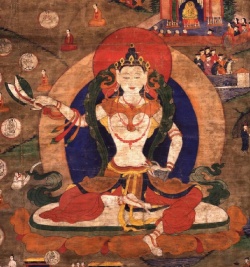A Buddhist Concept of Nature
Nagarjuna said that for a system where emptiness is possible, it is also possible to have functionality, and since functionality is possible, emptiness is also possible. So when we talk about nature, the ultimate nature is emptiness. What is meant by emptiness, or shunyata? It is not the emptiness of existence but rather the emiPtiness of true or independent existence, which means that things exist by dependence upon other factors.
So whether it is the environment that is inhabited, or the inhabitants, both of them are composed of four or five basic elements. These elements are earth, wind, fire, water and vacuum, that is space. About space, in the Kalachakra tantra there is a mention of what is known as the atom of space, particles of space. So that forms the central force of the entire phenomenon.
When the entire system of the universe first evolved, it evolved from this central force which is the particle of space, and also a system of universe and would dissolve eventually into this particle of the space. So it is on the basis of these five basic elements that there is a very close inter-relatedness or interrelation between the habitat that is the natural environment and inhabitants, the sentient beings living within it.
Also, when we talk of the elements there are internal elements which are existent inherently within sentient beings; they are also of different levels- some are subtle and some are gross.
So ultimately according to Buddhist teachings the innermost subtle consciousness is the sole sort of creator, itself consisting of five elements, very subtle forms of elements. These subtle elements serve as conditions for producing the internal elements, which form sentient beings, and that in turn causes the existence or evolution of the external elements. So there is a very close interdependence or Interrelationship between the environment and the inhabitants.
Within the meaning of interdependency there are many different levels that things are dependent upon casual factors, or upon their own parts, or the conceptual mind, which actually gives the label, the designation.
The topic that we are discussing today is the interrelationship or interdependence between the natural environment and the sentient beings living within it.
Now here, you see, some of my friends told me that basic human nature is something violent. Then I told my friends, I don't think so. If we examine different mammals, say those animals such as tigers or lions that very much depend on other's life for their basic survival these animals because of their basic nature have a special structure, their teeth and long nails, like that. So, those peaceful animals, such as deer, which are completely herbivorous, their teeth and nails are something different; gentler. So from that viewpoint, we human beings belong to the gentle category, isn't that so? Our teeth, our nails, these are very gentle. So I told my friends, I don't agree with your viewpoint. Basically human beings have a non-violent nature.
Also, about the question of human survival, human beings are social animals. In order to survive you need other companions; without other human beings there is simply no possibility to survive; that is nature's law, that is nature.
Since I deeply believe that basically human beings are of a gentle nature so I think the human attitude towards our environment should be gentle. Therefore I believe that not only should we keep our relationship with our other fellow human beings very gentle and non-violent, but it is also very important to extend that kind of attitude to the natural environment. I think morally speaking we can think like that and we should all be concerned for our environment.
Then I think there is another viewpoint. In this case It IS not a question of morality or ethics, not that question; is a question of our own survival. Not only this generation, but for other generations, the environment is something very important. If we exploit the natural environment in an extreme way, today we might gee-some other benefit but in the long run we ourselves will suffer and other generations will suffer. So when the environment changes, climatic conditions also change. When it changes dramatically, economic structures and many other things also change, even our physical body. So you can seethe great effect from that change. So from that viewpoint this is not only a question of our own survival.
Therefore, in order to achieve more effective results and in order to succeed in the protection, conservation and preservation of the natural environment, first of all, I think, it is also important to bring about internal balance within human beings themselves. Since negligence of the environment - which has resulted in lots of harm to the human community - came about by ignorance of the very special importance of the environment, I think it is very important first of all to instill this knowledge within human beings. So, it is very important to teach or tell people about its importance bring own benefit.
Then, one of the other most important things again, as I am always saying, is the importance of compassionate thought. As I mentioned earlier, even from ones own selfish viewpoint, you need other people. So, by showing concern for other people's welfare, sharing other people's suffering, and by helping other people, ultimately one will gain benefit. If one thinks only of oneself and forgets about others, ultimately one will lose. This also is something like nature's law. I think it is quite simple. If you do not show a smile to other people, and show some kind of bad look or like that, the other side wi1l also give a similar response. Isn't that right? If you show other people a very sincere and open attitude there will also be a similar response. So it is quite simple logic. Everybody wants friends and does not want enemies. The proper way to create friends is through a warm heart and not simply money or power. Friends of power and friends of money are something different. These are not friends.
A true friend should be a real friend of heart, isn't it so? I am always telling people that those friends who come to you when you have money and power are not your true friends but friends of money and power. Because as soon as your money and power disappear, those friends are also ready to say goodbye, bye-bye. So you see these friends are not reliable. Genuine and true human friends will always share your sorrow, your burdens and will always come to you whether you are successful or unlucky. So the way to create such a friend is not through anger, not mere education, not mere intelligence, but by the heart - a good heart. So, as I always say if you think in a deeper way if you are going to be selfish, then you should be wisely selfish, not narrow mindedly selfish. From that viewpoint, the key thing is the sense of Universal Responsibility, that is the real source of strength, the real source of happiness.
From that perspective, if in our generation we exploit every available thing: trees, water, mineral resources or anything, without bothering about the next generation, about the future, that's our guilt, isn't it? So if we have a genuine sense of universal responsibility, as the central motivation and principle, then from that direction our relations with the environment will be well balanced. Similarly with every aspect of relationships, our relations with our neighbors, our family neighbors, or country neighbors, will be balanced from that direction.
Actually, in ancient rimes many great thinkers, as well as great spiritual masters were produced in this country, India. So, I feel in modern times these great Indian thinkers, such as Mahatma Gandhi as well as some politicians, implemented these noble ideas like ahimsa in the political arena. In a certain way India's foreign policy of non-alignment is also related to with that kind of moral principle. So I think further expansion, or further development of these noble ideas, or noble actions, in this country is very relevant and very important.
Now in this respect, another thing which I feel to be very important is what is consciousness, what is mind? Up to now, especially I think in the Western world, during the last one or two centuries science and technology have been very much emphasized and that mainly deals with matter.
Now, today, some of the nuclear physicists and neurologists have started investigating and analyzing particles in a very detailed and deep way. While doing so, they found out some kind of involvement from the observer's side which they sometimes call "the knower". What is," the knower"? Simply speaking it is the being, the human being, like the scientists through which ways do scientists know? I think through the brain. Now, about the brain, Western scientists have not yet fully identified the more than hundred billion of cells of the brain. I think out of a hundred billion only a few hundred have been identified so far. So now the mind, whether you call it mind or a special energy of the brain, or consciousness, You will see that there is a relationship between the brain and the mind and the mind and matter. This I think is something important. I feel there should be some sort of dialogue between eastern philosophy and Western science on the basis of the relationship between mind and matter.
In any case, today our human mind is very much looking at or very much involved with the external world. I think we are failing to care for or study the internal world.
We need scientific and material developments in order to survive, in order to get benefits and in order to have more prosperity. Equally we need mental peace. Any doctor cannot inject mental peace: no market can sell mental peace or happiness. With millions and millions of rupees you can buy anything but if you go to a supermarket and say I want peace of mind, then people will laugh. And if you ask a doctor, I want genuine peace of mind, not a dull one, you might get one sleeping pill, or some injection. Although you may get rest, the rest is not in the right sense, is it?
So if you want genuine mental peace or mental tranquility the doctor cannot provide it. A machine like the computer, however sophisticated it may be, cannot provide you with mental peace. Mental peace must come from the mind. So everyone wants happiness, pleasure. Now, compare physical pleasure and physical pain with mental pain or mental pleasure and you will find that the mind is superior, more effective and more dominant. Therefore it is worthwhile to increase mental peace through certain methods. In order to do that it is important to know more about mind. That also, I always feel, is very important. I think that is all.
So when you say environment, or preservation of environment, it is related with many things. Ultimately the decision must come from the human heart, isn't that right? So I think the key point is genuine sense of universal responsibility which is based on love, compassion and clear awareness.
Transcript of an address on February 4, 1992, at New Delhi, India.
Source
http://www.dalailama.com/messages/environment/buddhist-concept-of-nature




